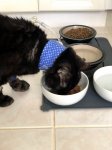Leigh B
Member
My Murphy threw up Friday morning. His BG was at 64, so I did not give him insulin. He did eat, and I tested him 2 hours later. He was at 143. 5 hours after that, he was at 503, so I gave him 1 unit.
I had to go out of town, so my husband fed him and gave him 2 units at dinner.
Saturday, he had breakfast and had his 2 units, as usual. My husband called around 6:45 pm and said Murphy had thrown up all over our bedroom and was not eating anything. He has been drinking lots of water.
I told him to avoid the insulin shot, since Murphy was not eating and I rushed home this morning.
I have tried to get Murphy to eat ANYTHING, and he is not interested. He is parked in front of the water bowl and is very lethargic.
I was able to catch some urine and do a ketone test. The strip showed that he has a large amount of ketones (80) in his urine (I test every month or so, and it is usually "none" to "Very little")
My usual vet is closed today. I am going to reach out to his last vet clinic, they open in 30 minutes.
Any advice? I have not updated his chart, but his numbers have been steady. He DID have a teeth cleaning and extraction over a week ago. All of his bloodwork, other than the diabetes, was normal.
Oh, and his BG was 326 at 12:30 and 388 at 1:05 today- a little while ago.
I had to go out of town, so my husband fed him and gave him 2 units at dinner.
Saturday, he had breakfast and had his 2 units, as usual. My husband called around 6:45 pm and said Murphy had thrown up all over our bedroom and was not eating anything. He has been drinking lots of water.
I told him to avoid the insulin shot, since Murphy was not eating and I rushed home this morning.
I have tried to get Murphy to eat ANYTHING, and he is not interested. He is parked in front of the water bowl and is very lethargic.
I was able to catch some urine and do a ketone test. The strip showed that he has a large amount of ketones (80) in his urine (I test every month or so, and it is usually "none" to "Very little")
My usual vet is closed today. I am going to reach out to his last vet clinic, they open in 30 minutes.
Any advice? I have not updated his chart, but his numbers have been steady. He DID have a teeth cleaning and extraction over a week ago. All of his bloodwork, other than the diabetes, was normal.
Oh, and his BG was 326 at 12:30 and 388 at 1:05 today- a little while ago.



